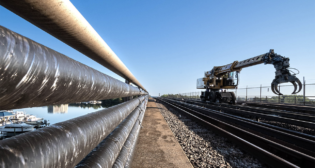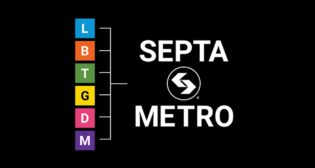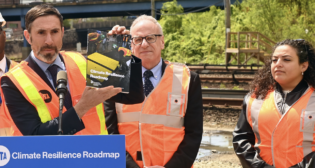
Transit Briefs: NYMTA, City of Honolulu, TTC, 2023 Transit Omnibus Bill
Written by Carolina Worrell, Senior Editor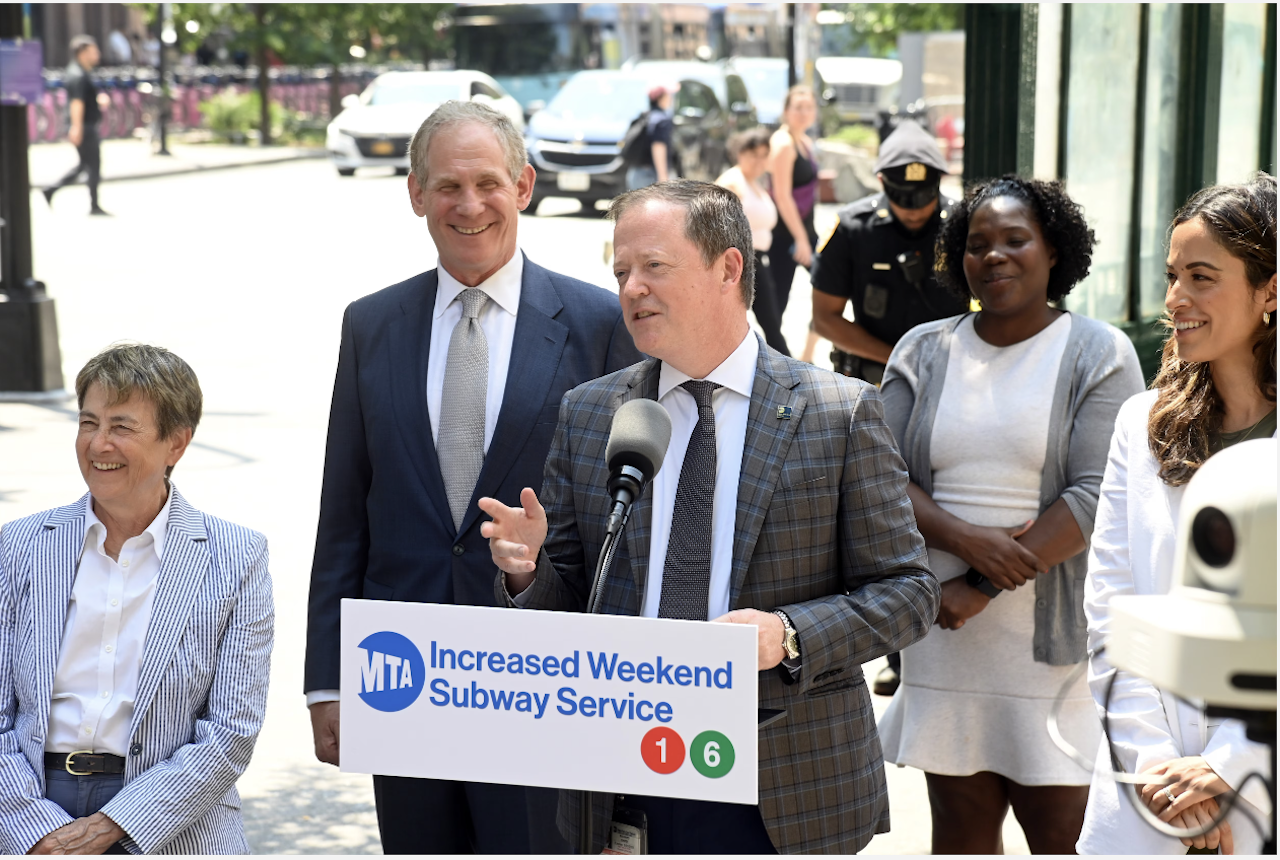
MTA photo
The New York Metropolitan Transportation Authority (MTA) announces next phase of service increases to begin on 1 and 6 subway lines. Also, Honolulu plans $257.1 million Capital Improvement Program (CIP); the Toronto Transit Commission (TTC) pilots Contactless Access™ elevator app at select subway stations; and Gov. JB Pritzker signs State Rep. Kam Buckner’s 2023 Transit Omnibus Bill.
NYMTA
The New York MTA on Aug. 9 announced that the next phase of subway service enhancements will begin on Saturday, Aug. 12, with headways of approximately six minutes instead of every eight minutes on the 1 and 6 subway lines.
The planned enhancements, which were made possible through $35 million of funding in the FY24 New York State Budget, focus on periods where subway ridership has recovered from its pre-pandemic baseline, according to the agency. Subway ridership overall continues to recover with the latest trend showing 3.85 million paid riders on a typical average weekday and 2.2 million riders on an average Saturday or Sunday. Weekend ridership has outpaced weekday ridership in its recovery, with weekend ridership around 80% of its pre-COVID baseline, compared to weekdays when ridership has been around 65% to 70% of the pre-COVID baseline. The 1 train carries approximately 285,000 on an average weekend day, while the 6 train serves 270,000.
New York City Transit (NYCT) explored where additional off-peak service would have the most benefit, focusing primarily on lines with train frequencies of 10 to 12 minutes during off-peak hours. Planned work was taken into consideration when these enhancements were planned to ensure “critical state of good repair work and capital work would not be affected,” according to the agency.
The first phase of weekend service increases on the G, J and M lines, increasing frequency on the three lines with trains arriving every eight to 10 minutes instead of every 10 to 12 minutes, began on Sunday, July 2. The first phase of weekday service increases on the C line began on Monday, Aug. 7, with midday trains arriving every eight minutes instead of every 10 minutes. Later this month, midday service N and R lines will increase with trains arriving every eight minutes instead of every 10 minutes.
Later this year and through Summer 2024, the following service increases are scheduled to go into effect:
Third Phase, December 2023: Evening Service Increase on C, N and R Lines and Midday Service on G Line
To end 2023, evening service on weekdays will increase on the C, N and R Lines and midday service will increase on the G line. Trains on those lines would arrive every eight minutes under the enhanced service. Additionally, six minute service on the 1 and 6 Lines during the weekend would be extended to include more hours of the day.
Fourth Phase, July 2024: Midday and Evening Weekday Service Increases on B, D, J and M Lines.
The final phase of the planned service enhancements is scheduled for July 2024, with weekday service increases on the B, D, J and M Lines. The service increase would have trains arriving every eight minutes. Additionally, service would be added to the 3 and 5 Lines on weekends, with trains arriving every 10 minutes.
“It’s no secret that weekend ridership and discretionary travel are rebounding to pre-COVID levels faster than weekdays, and adding more service is going to help us build on that momentum,” said MTA Chair and CEO Janno Lieber. “We’ve said this whole time that once the funding is there, we’d look to expand service outside of the weekday peaks. Now, thanks to the budget passed by Governor Hochul and the State Legislature, we have the money and we’re keeping our promise.”
“Customers consistently tell us that improved service and reduced wait times will increase their satisfaction and bring them back to the subway more frequently, and we are listening,” said NYCT President Richard Davey. “These service enhancements mean 1 and 6 train customers will wait no more than six minutes between trains on the weekend and can travel with confidence that the subway is the fastest way to get around New York City.”
City of Honolulu
The City of Honolulu plans to sell $251.1 million in general obligation bonds to subsidize its 2024 CIP, as well as ongoing construction of the Honolulu Authority for Rapid Transportation’s (HART) rail project, according to a Star Advertiser report.
According to the report, the city’s aim is to “offer the bonds to local Hawaii investors during a special two-day retail order period,” beginning Aug. 8.
The city will “issue and sell the series of 2023 GO bonds toward major projects that include the nearly $10 billion Skyline route, which is planned for completion by 2031, and the city’s $1.34 billion-plus CIP budget for the current fiscal year, which began July 1,” according to the Star Advertiser report.
Andrew Kawano, the city’s Department of Budget and Finance Director, said orders will be taken Tuesday and Wednesday from all buyers, including Hawaii investors, and the city’s underwriter will determine which orders are “consummated” with those buyers, according to the report.
“It provides retail investors with an initial and attractive opportunity to purchase the city’s GO bonds and thereby enhancing the volume of buy orders from retail investors,” Kawano said via email.
“In general, bonds’ proceeds from these sales will be used to fund the city’s CIP and equipment budgets as funding is needed,” Kawano added. “There is no direct ‘tie-in’ to projects at the time of the bond sales.”
Likewise, according to the Star Advertiser report, Kawano said GO bonds are not “specifically designated to a particular part of the rail line” either—like the 5.2-mile segment from Aloha Stadium to Middle Street planned for completion by mid-2025—but would instead act as “bridge financing for the rail construction” overall.
TTC
TTC announced Aug. 9 that it is piloting the Contactless Access™ at select subway stations, allowing customers to control elevators and providing a quick, sanitary, and touch-free experience.
The Contactless Access™ elevator app pilot project, according to TTC, allows customers to use their smartphone to control elevators, providing a touch-free experience, especially for customers with disabilities, seniors, and those who may be carrying large objects or pushing strollers.
Stations included in the pilot project are Finch, Kennedy, Kipling, Union and Vaughan Metropolitan Centre stations. Customers will need to download the free Contactless Access™ app from the Apple App Store or Google Play. They can also scan the QR code posted at any of the elevators included in the pilot.
The app uses Bluetooth Low Energy technology to allow wireless control of elevator buttons from up to 10 feet away, and does not require customers to be connected to WiFi or a data network to use the app. No personal data will be collected or stored by the app. Use of the app is optional, and customers can also continue to use the existing buttons to control elevators included in this project.
The pilot will run until Sep. 30, 2023.
2023 Transit Omnibus Bill
Illinois Gov. JB Pritzker has signed State Rep. Kam Buckner’s (D-26th) latest bill on public transportation, HB1342-Transit Riding Privileges/Fare or the 2023 Transit Omnibus Bill, according to a Streetsblog Chicago report.
According to the report, there are four main components to the bill, including:
- “Prioritizing safety on public transportation by allowing transit agencies to suspend riders who have committed crimes like assault, sexual assault, and battery.
- “Helping domestic violence survivors through the creation of the Domestic Violence and Sexual Assault RTA Public Transportation Assistance Program.
- “Investing in young people by expanding free and reduced fares for youth traveling to and from work or attending career-oriented programs (the program is available to people aged 12-24)
- “Putting the City of Chicago on track to meet climate goals by requiring the Chicago Transit Authority (CTA), Metra and Pace to only purchase electric vehicles beginning in July 2026.”
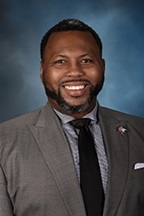
In an X (formerly Twitter) thread, Buckner highlighted other goals the legislation tries to accomplish. He noted that the Regional Transportation Authority (which oversees local transit funding), CTA, Metra, and Pace will “have to make data available on reliability, safety, staffing levels, schedules, delivery of service, and overall system safety. It will extend COVID-era relief from the 50 percent farebox recovery ratio, which requires systems to pay for half of operating costs through fares and other revenue sources like advertising, through 2025. And by 2024, a report to the General Assembly on free/reduced fare programs and their effectiveness will be due,” according to the Streetsblog Chicago report.
